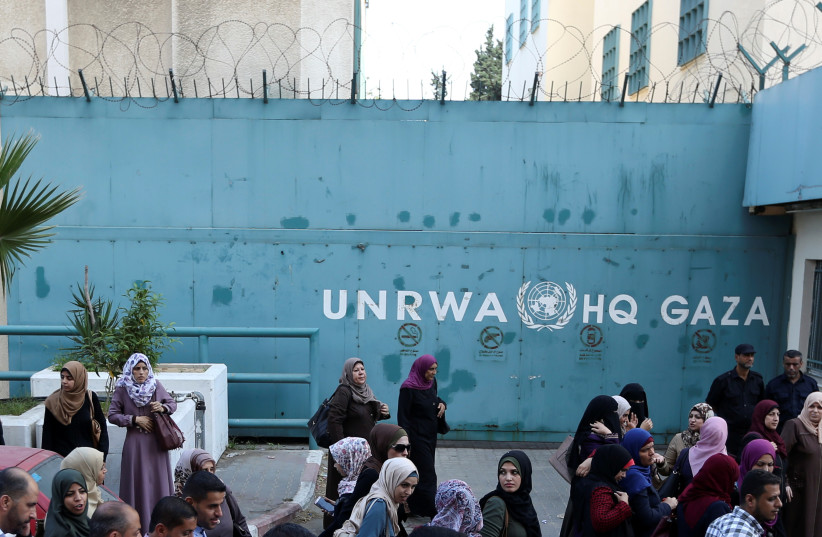This past week, Israelis and Jews worldwide have been absorbed in contemplating how to celebrate Passover, which typically rejoices in the freeing of Jews from the shackles of slavery in ancient Egypt.
In dire reality, 133 hostages taken from Israel remain in the shackles of Hamas for over 200 days.
Also during this holiday period, an Independent Review Group on UNRWA, appointed by United Nations Secretary-General Antonio Guterres in early February 2024, submitted a 54-page report with its findings.
Assessing UNRWA's adherence to neutrality
The review group was tasked with assessing UNRWA’s adherence to principles of neutrality. Led by former French foreign minister Catherine Colonna, it commissioned three organizations (from Sweden, Denmark, and Norway) to extensively analyze the UN agency.
The report’s research methodology was comprised of field visits to UNRWA headquarters and interviews with more than 200 people from 47 countries and organizations.

While much of the public discourse vis-à-vis the report centers on Israel’s failure to equip the review group with evidence regarding the involvement of UNRWA employees with Hamas, which Israel publicly denies, perpetuating this conversation misses the very important claims made by the report regarding UNRWA’s neutrality – or lack thereof.
The review group outlines no fewer than 50 policy recommendations that UNRWA should implement to strengthen its neutrality. The mere number is enough to signal that there is much work to be done on UNRWA’s end.
The recommendations categorize into eight sub-fields, each shedding important light on the array of UNRWA’s operational failures.
However, a key finding that spans multiple categories most poignantly highlights UNRWA’s gaping deficiency: the disproportionate number of local versus international UNRWA employees. To substantiate this, of the more than 32,000 UNRWA staff and personnel, 0.8% are international and 99.2% are locally recruited.
One implication of this ratio that the report points to is its creation of a culture resistant to modernization and reform across levels and roles, noticeable even in basic efforts to increase the agency’s efficiency through job cuts, for example. Naturally, this makes much-needed change, in multiple aspects, “a complex endeavor for UNRWA management.”
A more concerning implication is the report’s clear assertion that, given this ratio, security challenges in Gaza may prevent the reporting of neutrality breaches and investigations at the local level.
A third implication of this ratio, detailed in the report under “Management and internal oversight structures,” is that roles inside UNRWA, designed to ensure the agency’s neutrality-abiding principles, are left unmanned.
To illustrate, 50 neutrality cases are under investigation to date, with as few as six international investigator posts allocated to do the work. On the ground, two of these positions are vacant, and three are limited-duration contract positions based on project funding. To think that an organization with 32,000 employees is unable to fill these positions is very disturbing.
A fourth implication of this ratio appears under the category “neutrality of staff unions” and notes – black on white – that “there are longstanding concerns over politicization and interlinkages with Palestinian political factions in UNRWA staff unions, with a direct impact on UNRWA’s neutrality.”
Even more alarming is the fact that intimidation tactics and threats by staff unions have literally led numerous UNRWA directors to be transferred to different positions for their own security.
This is a disturbing account of an over-powerful group of local, politically motivated employees within UNRWA that de facto determines organizational priorities. All of this is happening under a dictatorial Hamas-led regime.
A fifth implication of this ratio is important, primarily in the current, post-October 7 context in which Israel strives to gradually transfer UNRWA’s responsibilities to more neutral humanitarian providers.
As opposed to UNGA Resolution 302, which founded UNRWA in 1949 and calls for cooperation with other agencies and organizations, the Review Group noted pushback against such cooperation from UNRWA staff associations that perceive partnerships as weakening UNRWA and hence, against the backdrop of the Gaza population’s dire humanitarian needs, prefer UNRWA’s survival. As a result, less aid reaches the Gazans who need it.
FINALLY, PERHAPS the most important assertion that the report makes is that “any involvement in a militarized group that promotes discrimination or violence, such as Hamas or Islamic Jihad, violates the principle of neutrality.”
However, the UN does not recognize these players as terror organizations, which puts a large question mark on the Review Group’s ability to carry out a serious investigation into UNRWA’s neutrality.
Given these six takeaways, along with the fact that Hamas runs a dictatorial regime in the Gaza Strip and, according to data, more than 99% of the agency’s staffers are local Gaza residents, the natural conclusion is that the basic conditions in which UNRWA-Gaza operates prevent its neutrality.
Research and an updated accumulation of facts regarding UNRWA’s questionable neutrality have finally been conducted.
These conclusions should be resonated and amplified by anyone who cares about alleviating the humanitarian situation in Gaza and paving the road for a better reality for Israelis and Palestinians post-October 7.
The writer is senior adviser and program director at MIND Israel, an adjunct lecturer at Tel Aviv University, and a founding member of Devorah Forum: Women in Foreign Policy and National Security.
